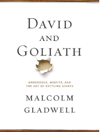Standards, Grittiness, and the Underdog
 In his book, “David and Goliath: Underdogs, Misfits, and the Art of Battling Giants,” Malcolm Gladwell argues that the people we traditionally considered to be underdogs might actually have unique advantages created by the very adversity they had to overcome. Gladwell uses the allegory of David and Goliath to dramatize how David’s victory may not have been as unlikely or extraordinary as we are led to believe. Perhaps, David relied simply on an unconventional approach and his own audacity to blindside Goliath. His experience as an underdog forced him to view the situation differently and discover a creative solution to his problem. David didn’t view Goliath simply as an indestructible giant. Rather, he saw a slow opponent, dragged down by his armor, and unprepared to battle a swifter, more prepared adversary.
In his book, “David and Goliath: Underdogs, Misfits, and the Art of Battling Giants,” Malcolm Gladwell argues that the people we traditionally considered to be underdogs might actually have unique advantages created by the very adversity they had to overcome. Gladwell uses the allegory of David and Goliath to dramatize how David’s victory may not have been as unlikely or extraordinary as we are led to believe. Perhaps, David relied simply on an unconventional approach and his own audacity to blindside Goliath. His experience as an underdog forced him to view the situation differently and discover a creative solution to his problem. David didn’t view Goliath simply as an indestructible giant. Rather, he saw a slow opponent, dragged down by his armor, and unprepared to battle a swifter, more prepared adversary.
Gladwell continues his theory by describing a seeming disadvantage, dyslexia, as a “desirable difficulty.” He postulates that dyslexia actually forces learners to spend more effort reading and creating alternative strategies. By working harder to overcome their reading disability, dyslexics might somehow cultivate a better learning capacity that gives them an actual advantage.
This is a radical notion; however educators may recognize this phenomenon as “grit.” As controversial as the idea may seem at its face, it might be enough to inspire the underdog in our classroom to find his or her own unique talents and capitalize on them to succeed. As the Florida Department of Education delves further into the new Florida Standards, it is important to teach each student how to grow their mind, recognize their strengths, and find creative solutions to problems. I hope this story encourages each of us to unleash our own underdog and succeed where we previously fell short.

Resources:
David and Goliath: Underdogs, Misfits, and the Art of Battling Giants
Post by Andrea Bracco, 8th Grade Language Arts Instructor
